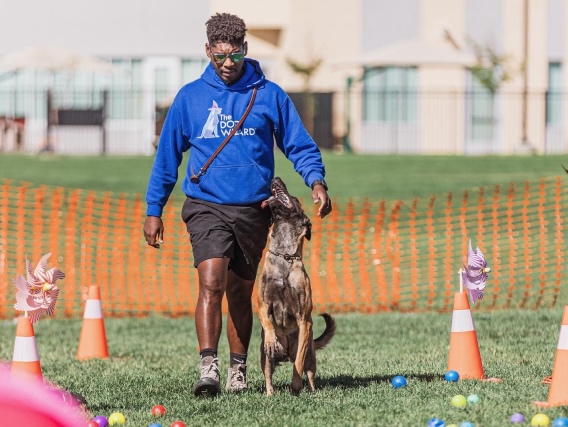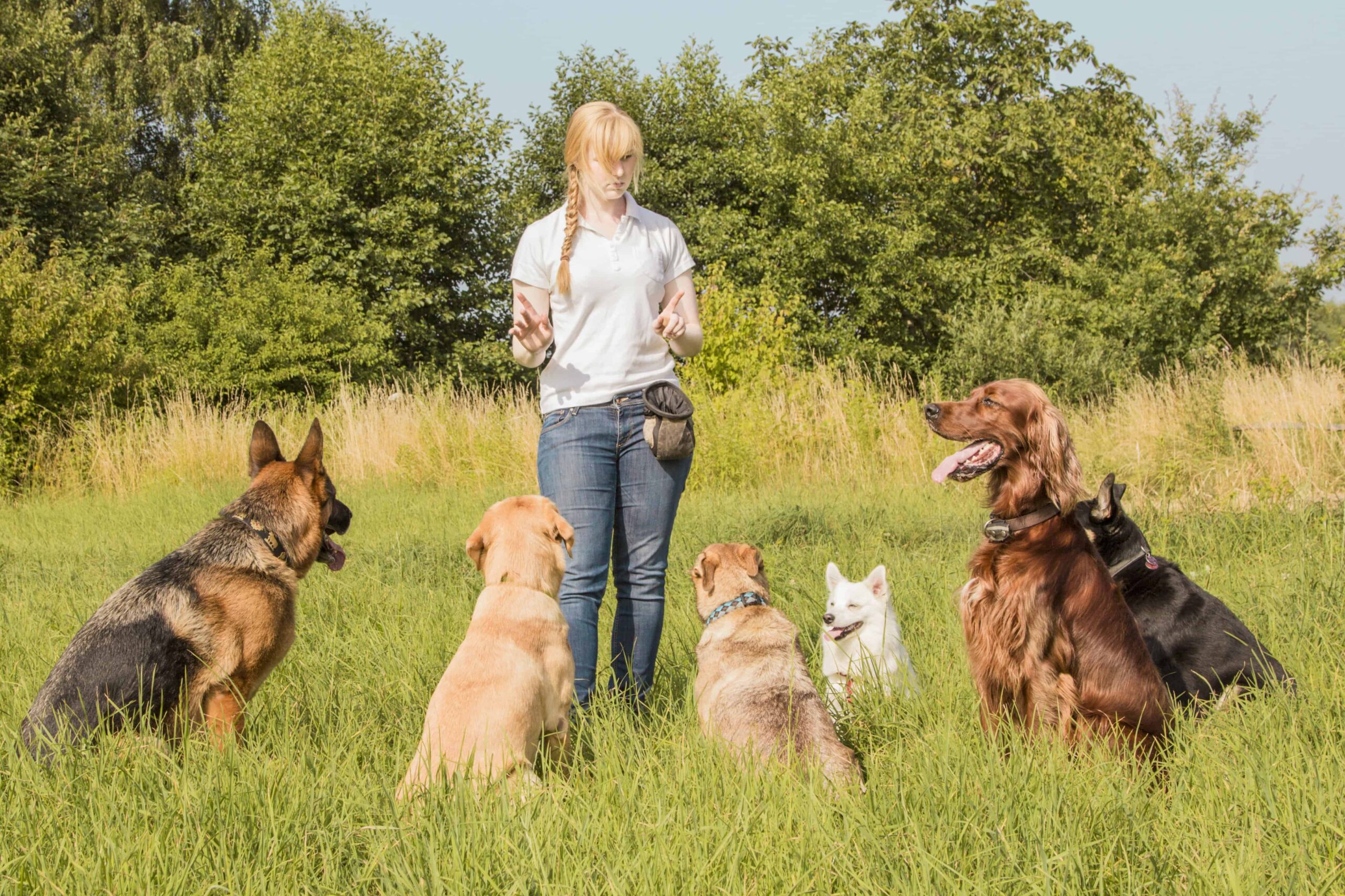Unleash Potential with Dog Training Near Me: Locate Your Local Professionals
Unleash Potential with Dog Training Near Me: Locate Your Local Professionals
Blog Article
Unlock Your Pet's Prospective: Proven Pet Dog Training Strategies for Success
Efficient canine training is a nuanced procedure that hinges on understanding canine behavior and employing medically backed strategies. Dog training. By incorporating positive reinforcement, establishing clear commands, and focusing on socialization, canine proprietors can grow an efficient partnership with their pets. Obstacles usually develop that require customized solutions and a patient technique. Exploring these verified methods discloses not only the capacity for behavior improvement but also the much deeper bond that can be formed in between owner and pet dog. What essential strategies must be considered to truly unlock your pet's potential?
Comprehending Pet Dog Habits
Understanding canine actions is essential for efficient training and cultivating a positive connection in between canines and their proprietors. A thorough understanding of canine body movement, vocalizations, and social communications is important for identifying their emotions and requirements. Dogs connect mostly with non-verbal signs; for instance, a wagging tail might indicate exhilaration, while pinned ears can indicate concern or submission.

Furthermore, ecological variables play a substantial duty in shaping a canine's behavior. Modifications in regular, brand-new surroundings, or the existence of unfamiliar people can bring about stress or stress and anxiety in dogs. Identifying these triggers makes it possible for proprietors to reduce unfavorable responses and establish suitable training strategies.
Eventually, a deep understanding of pet dog actions lays the foundation for effective training techniques, enhancing both behavior and the general bond between the pet dog and its proprietor. Dog training. This expertise is indispensable for fostering a well-adjusted, happy canine buddy
Favorable Support Methods
Effective training relies greatly on favorable support techniques, which have been shown to produce significant lead to forming wanted actions in pets. This approach includes awarding a pet dog for displaying certain behaviors, consequently raising the probability that these behaviors will be duplicated. Rewards can take various forms, consisting of deals with, praise, toys, or play, depending on what inspires the individual dog.

It is necessary to gradually terminate benefits as the canine learns the behavior, transitioning to intermittent support. This method maintains the actions with time while stopping dependency on consistent benefits. By concentrating on favorable reinforcement, instructors can cultivate a trusting partnership with their pets, advertising a healthy and cooperative training setting that improves general obedience and performance.
Developing Constant Commands
A fundamental element of successful pet dog training is the facility of consistent commands. Uniformity in commands is important for efficient interaction in between the go to this site pet dog and the fitness instructor. When commands are uniform, pet dogs discover to connect particular words with wanted actions, which accelerates the training process and boosts understanding.
To develop constant commands, it is important that all household participants utilize the same terms and gestures. If one person utilizes "rest" while one more claims "sit down," it can develop confusion for the pet. Select clear, unique words for commands and guarantee everybody associated with the dog's training complies with these selections.
Additionally, repeating is vital. Strengthen commands with constant technique, guaranteeing that the pet gets sufficient chances to respond appropriately. When a pet effectively adheres to a command, instant favorable reinforcement ought to adhere to. This can be in the type of deals with, praise, or playtime, strengthening the connection between the activity and the command.
Finally, hold your horses. Establishing constant commands takes some time and effort. With devotion and clarity, you will certainly assist your pet establish a strong understanding of assumptions, eventually leading to a well-behaved friend.
Socialization and Exposure
Socializing a dog is necessary for promoting a well-adjusted and positive friend. This procedure involves exposing your pet dog to a selection of atmospheres, individuals, and other pets to develop their social abilities and adaptability. Early psychiatric service dog training cost socialization, preferably in between the ages of 3 to fourteen weeks, is vital, as it prepares for a pet's future actions.
Throughout socializing, objective to provide positive experiences in various setups, such as parks, busy streets, and homes with other pet dogs. Introduce your pet dog to various stimulations, consisting of sounds, sights, and smells, ensuring that each encounter is satisfying. This direct exposure assists alleviate fear and anxiety, leading the way for a much more resistant canine.
Involving in controlled team play sessions with various other pets can likewise enhance social abilities, teaching your family pet ideal communications and borders. Prioritizing socializing will dramatically add to your dog's overall happiness and behavior throughout their life.
Overcoming Common Training Challenges

One more constant problem is disturbance. Pet dogs might have a hard time to concentrate in busy or unfamiliar setups. Progressively desensitize your canine to disturbances by starting training in a peaceful environment and slowly presenting even more stimuli as they end up being proficient (dog training charlotte). Positive reinforcement strategies, such as treats and appreciation, can keep motivation and focus.
Additionally, behavioral problems like jumping or excessive barking can come to be discouraging. Address these by instructing alternate behaviors, such as resting calmly when welcoming guests. Consistency and persistence are critical; enhance desired behaviors consistently and avoid scolding, which can result in complication.
Lastly, recognize that each dog is unique, and training timelines may differ. Dressmaker your strategy to your pet's specific demands, and look for specialist support if needed. With determination and the appropriate methods, conquering these difficulties can lead to a trained, satisfied canine buddy.
Final Thought
Finally, unlocking a dog's possible requires an extensive method that incorporates an understanding of canine actions, the application of favorable reinforcement techniques, and the facility of constant commands. Early socialization and exposure to varied atmospheres further boost a canine's flexibility and self-confidence. By attending to typical training challenges with customized methods and patience, a unified and participating connection in between pet dog and handler can be fostered, ultimately causing a well-behaved companion with the ability of flourishing in numerous circumstances.
Effective pet dog training is a nuanced process that pivots on understanding canine actions and using clinically backed strategies.Comprehending dog habits is important for reliable training and fostering a favorable partnership between pets and their owners.Efficient training relies greatly on favorable reinforcement strategies, which have been shown to generate significant results in forming desired habits in pets. When commands are uniform, canines find out to associate specific words with preferred Read More Here habits, which increases the training process and improves understanding.
In verdict, unlocking a canine's prospective demands an extensive technique that includes an understanding of canine behavior, the application of positive support strategies, and the facility of consistent commands.
Report this page